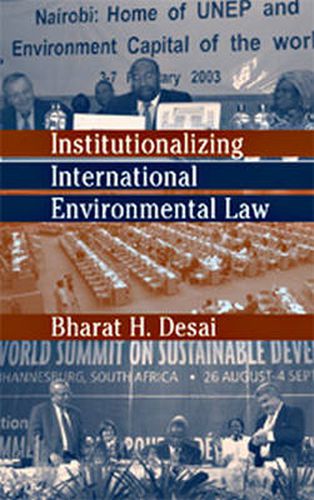Readings Newsletter
Become a Readings Member to make your shopping experience even easier.
Sign in or sign up for free!
You’re not far away from qualifying for FREE standard shipping within Australia
You’ve qualified for FREE standard shipping within Australia
The cart is loading…






This is a study of the law-making process and the linkage between international environmental law and international environmental institutions. International regulation of state behaviour poses special challenges for the conservation of natural resources and the protection of the environment. The corpus of international environmental law churned out by this new challenge has necessitated institutional structures. ‘Institutionalisation’ has kept pace with the development of this nascent branch of international law, and the institutionalisation of international environmental law has become an integral part of the intergovernmental effort to establish a threshold for state behaviour. While international environmental institutions are the result of the need for international co-operation, they acquire their own momentum in catalysing international environmental law once they have been set up. They are a product as well as a contributor to the development of international environmental law. Institutions are products of a complex process of institutionalisation; they engage in norm-building in various complex areas of interdependence. This study also shows that international institution building is an organic process directly geared to the needs of states. It underscores the fact of international life that institutions are essentially tools, operating within legal parameters, for states to address global problems.
$9.00 standard shipping within Australia
FREE standard shipping within Australia for orders over $100.00
Express & International shipping calculated at checkout
This is a study of the law-making process and the linkage between international environmental law and international environmental institutions. International regulation of state behaviour poses special challenges for the conservation of natural resources and the protection of the environment. The corpus of international environmental law churned out by this new challenge has necessitated institutional structures. ‘Institutionalisation’ has kept pace with the development of this nascent branch of international law, and the institutionalisation of international environmental law has become an integral part of the intergovernmental effort to establish a threshold for state behaviour. While international environmental institutions are the result of the need for international co-operation, they acquire their own momentum in catalysing international environmental law once they have been set up. They are a product as well as a contributor to the development of international environmental law. Institutions are products of a complex process of institutionalisation; they engage in norm-building in various complex areas of interdependence. This study also shows that international institution building is an organic process directly geared to the needs of states. It underscores the fact of international life that institutions are essentially tools, operating within legal parameters, for states to address global problems.